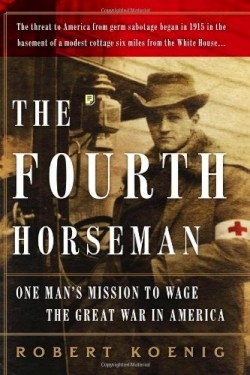The Fourth Horseman
One Man's Mission to Wage The Great War in America
Had Samuel Johnson lived in the early twentieth century, his observation that “Patriotism is the last refuge of a scoundrel” would have applied to Anton Dilger, who sacrificed his medical ethics for his blind patriotism to Prussia. He gave up a promising career as a surgeon to become the first doctor to use germs as weapons of biological destruction. The author, a contributing correspondent for Science magazine, has written about German subjects for more than twenty years and has researched germ warfare while acting as publications director of a prominent microbiology research laboratory. He tells Dilger’s story in a style that is as intriguing as a well-written espionage novel.
Anton Dilger was born in America, an American citizen who was the son of a Union Army Civil War hero, Hubert “Leatherbreeches” Dilger, who received the Medal of Honor. In 1894, when Anton was ten years old, his older sister and her wealthy German husband took him to live in Germany. A bright student, he received his medical degree from Heidelberg University, the premier medical school of its time.
Dilger returned to America in 1915, following his service as a surgeon in the German army. Incensed by President Wilson’s claim of American neutrality during World War I, while selling munitions and horses to Germany’s enemies (England and France), Dilger performed espionage for Germany by cultivating anthrax and glanders (a germ that killed horses quickly and in large numbers) in his Chevy Chase home, six miles from the White House. The United States sold thousands of horses to the Allies, who used them to cart heavy artillery weapons during the war.
The most intriguing chapters of this book investigate Dilger’s mission to convince Mexico, with the promise of German financial support and weapons, to invade the Southwestern United States. This would lessen significantly the troops that America could send to Europe. When Germany and Dilger realized that this unrealistic ploy would fail, he fled to neutral Spain. In Spain, his life was in danger from the Americans who were closing in on him and from the Germans who believed he knew too much. Perhaps justly, this traitor who devoted his talents to germ warfare was killed by the influenza pandemic that claimed the lives of fifty million people worldwide. Or so the public record states. The author speculates that Dilger might have falsified his death and possibly escaped to South America and lived out his life in Mexico.
This page-turner asks as many questions as it answers and Dilger appears often as a two-dimensional character, through no fault of the author, who did admirable work in assembling Dilger’s life story from the few existing records about and by him.
Reviewed by
Karl Helicher
Disclosure: This article is not an endorsement, but a review. The publisher of this book provided free copies of the book to have their book reviewed by a professional reviewer. No fee was paid by the publisher for this review. Foreword Reviews only recommends books that we love. Foreword Magazine, Inc. is disclosing this in accordance with the Federal Trade Commission’s 16 CFR, Part 255.

